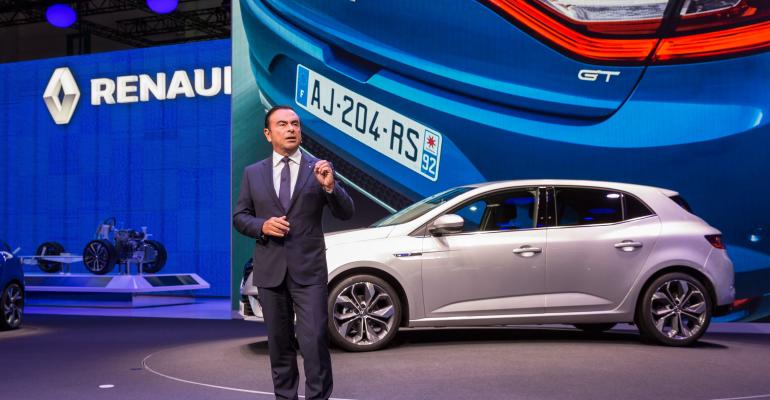FRANKFURT – Carlos Ghosn, chairman and CEO of the 16-year-old Renault-Nissan Alliance, declines to comment on Fiat Chrysler Automobiles CEO Sergio Marchionne’s pursuit of General Motors, but admits global automakers are on a path to closer cooperation that could force big-time tie-ups.
“It’s not a question of whether the industry needs consolidation,” he tells WardsAuto after unveiling the new Megane C-car. “Consolidation is a fact in our industry.”
Sounding much like Marchionne, whose merger appeal to GM in recent weeks has been resisted by its CEO, Mary Barra, Ghosn says the scope of investment costs related to technology development and the necessity to compete in every market segment in every market of the world compels consolidation.
“Everything is going in that direction,” says Ghosn, who oversees arguably the single most successful OEM alliance in recent history.
Barra, attending the Frankfurt auto show to unveil the new Opel Astra, a car that competes with the Megane and dozens of C-cars in Europe, continues to resist Marchionne’s overtures. She told reporters Tuesday “it’s not in the best interests of General Motors shareholders to merge with Fiat Chrysler.”
But Marchionne continues to put pressure on GM to join forces. He cites a potential $30 billion in annual cash generation for GM-FCA marriage through savings in product development and other back-end costs. Barra argues GM is too busy “merging with ourselves” as it works to more closely unite its various operations and brands around the world and says her company already has the scale to go alone.
The investment community, which would be the gatekeepers to a GM-FCA tie-up, has been lukewarm to the idea. Wall Street agrees with Marchionne’s assessment but given the recent track record of OEM mergers, including a GM-Fiat alliance in the 2000s that crumbled and cost GM billions of dollars, most doubt they could be mashed together efficiently.
Marchionne did not attend the show here this year, canceling his press conference appearances and media briefings to push a new UAW contract in the U.S. over the goal line. He appeared with union President Dennis Williams in Michigan to announce a tentative settlement Tuesday evening. However, he did receive another endorsement to his plan from Italian Prime Minister Matteo Renzi, who called a GM-FCA tie-up “difficult,” but nevertheless is hopeful it will happen.
Ghosn, whose Renault-Nissan alliance focuses more on mutual shareholding than a rationalization of operations, does not speculate on the nature of future industry consolidation, only to say it is inevitable and its biggest players must come to grips with the fact.
“I don’t think anyone can predict what form (consolidation) will take,” he says. “The past has shown us that the best predictions were always wrong, so I think we just need to be very modest, accept that the trend is in this direction and accept the fact that it might happen in many different ways.”





